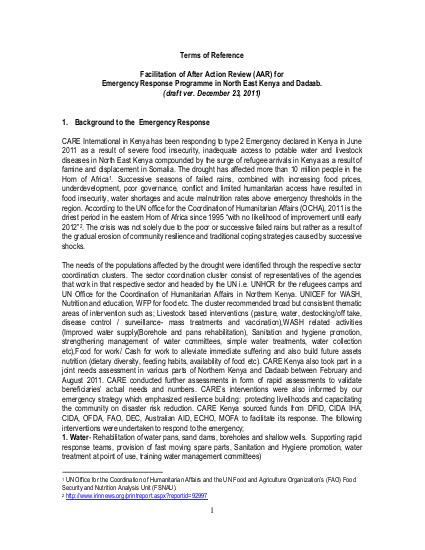
Overall objective:
CARE International’s current policy to conduct an After Action Review (AAR) 3 to 4 months after declaration of all Type 2 emergencies illustrates CARE’s commitment to continually improve its performance. The AAR is usually conducted as a two-day, structured, professional discussion of an emergency response to promote learning and accountability. The review focuses on performance, which enables those involved in the response to reflect on what happened and why; document the best practices, successes, challenges, and recommendations for what needs to change to sustain organizational strengths and improve on weaknesses in CARE Kenya’s emergency response programs. The purpose of an AAR is therefore to capture and learn from lessons identified during these discussions so that improvements can be made in CARE’s operational procedures, structures and policies. These may include recommendations to senior management in the country office, the lead member, CEG and other parts of CARE.
The specific objectives of the AAR are:
- To assess performance of CARE Kenya’s 2011 emergency response amongst staff and implementing partners so as to identify achievements and issues addressed to date; areas of collaboration and relationship management and the overall effectiveness of our interventions
- To identify positive and negative lessons learned (for CARE International in Kenya and other parts of CARE).
- To identify strengths, weaknesses, opportunities and challenges and to make action-oriented recommendations to enhance CARE Kenya’s future emergency preparedness planning and response and CI approach to future quick onset emergencies.
- To ensure that lessons learned and specific recommendations inform future planning both in country and internationally.
Also the results of this AAR will be utilized in reviewing CARE Kenya’s Emergency preparedness planning (EPP) strategy and also provide important inputs into Long Range Strategic Plan (LRSP) review.